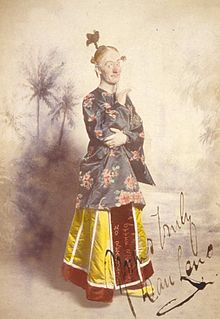- Widow Twankey
-
Widow Twankey is a female character in the pantomime Aladdin. The character is a pantomime dame, portrayed by a man; and is a comic foil to the principal boy, Aladdin – played by an actress.
History
The story of Aladdin is drawn from One Thousand and One Nights, a collection of Middle-Eastern fables. It was first published in England between 1704 and 1714; and this story was dramatised in 1788 by John O'Keefe for Covent Garden. In 1813, a comic character of the "dumb slave" was introduced to Aladdin, or the Wonderful Lamp, as a vehicle for the clown, Joseph Grimaldi, and at the same time, a washer-woman, Ching Mustapha was introduced to the play.[1]
Widow Twankey first occurs in 1861; the character runs a Chinese laundry in Peking, China and is a pantomime dame; that is, always played by a man. One of her sons, Aladdin, is the hero of the pantomime, while her other son, often named Wishy Washy (or Wishee Washee), just helps in the laundry. She is not pivotal in the plot (such as it is), but more a source of interaction with the audience through jokes and innuendo – mostly centred on items of underwear on the washing line.
The character has had a number of different names over the years: Ching Mustapha was followed by Wee Ping, Chow Chow, and Tan King. In 1861, the character became the Widow Twankay – named for a cheap blend of China tea.[1] Twankay (Chinese), or 'twankey tea' is an inferior grade of green tea, with an old, ragged, open leaf – the implication is that the widow is 'past her best'. The -kay, or -key ending derives from the Chinese (Mandarin) for tea – chá – a soft pronunciation gives the English slang char.[2] Occasionally the spelling of her name in the programme (but not the pronunciation on the stage) is varied to make it look more like a "Chinese" personal name – e.g., "Tuang Kee Chung" in a 1979 musical version.
The story is located in a mythical China, but with many Arabic ideas, names and places which betray its Middle-Eastern origins. In some productions, the Chinese laundry is located in Limehouse, in the East End of London. There was a considerable chinatown located here, since the early 19th century, to serve the needs of Chinese seamen. The area became infamous through exaggerated reports of opium dens and slum housing. Since the destruction of World War II, it has relocated to Soho.
Portrayals
Joseph Grimaldi took many of the early female roles in pantomimes at Drury Lane. He was notable for introducing the pantomime dame, and the tradition of audience participation and community singing. He was a specialist in physical comedy; particularly tumbling and falling.[3]The first "Widow Twankey" was played by James Rogers at the Strand Theatre on 1 April 1861, in an 'extravanganza' by H. J. Byron, Aladdin or The Wonderful Scamp – this play also featured a character named Pekoe.[1]
The comedian Dan Leno portrayed Widow Twankey from 1896 at the Theatre Royal, Drury Lane, with Marie Lloyd in the role of principal boy – Aladdin. Leno introduced dancing and long monologues with the audience to the role – bringing the then popular music hall into pantomime.
Aladdin continues as a part of the repertoire of the Christmas season. Today, the dame is often played by popular television stars, but in 2004 and 2005, Sir Ian McKellen played the part of Widow Twankey at the Old Vic. This reintroduced a tradition of senior classical actors playing pantomime, which was originally played in the theatrical off-season between December and April. This script was heavy with adult innuendo such as "I've got something cheesy bubbling in my oven" and "your front porch could do with a good lick".[4] A musical version of Aladdin was commissioned from Sandy Wilson, for the 1979–80 reopening season of the Lyric Hammersmith.
Widow Twankey was also portrayed by Michael Hurst (credited as "Edith Sidebottom") in three Hercules: The Legendary Journeys episodes. First in the season four episode "...and Fancy Free," followed by the episode "Men in Pink" He later reprised the role for the final time in a season five episode entitled "Greece is Burning." The character of Widow Twankey is a diva, married at least 12 times, and a teacher of dance.
References
- ^ a b c "The origin of popular pantomime stories", Victoria and Albert Museum, accessed 22 October 2011
- ^ The word tea, probably derives from the Chinese (Amoy) word te, although a similar word occurs in both Malay and Dutch (East Indies). Webster's Third International Dictionary of the English Language (Merriam, 1969) places the origin of the word with the town of Tunki, in Anhwei province
- ^ Moody, Jane. "Grimaldi, Joseph (1778–1837)", Oxford Dictionary of National Biography, Oxford University Press, 2004; online edition, January 2008, accessed 21 October 2011
- ^ Aladdin Michael Billington The Guardian December 20, 2004 accessed 10 July 2008
Wikimedia Foundation. 2010.

